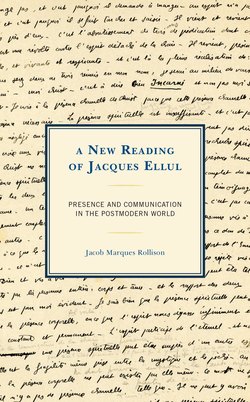Читать книгу A New Reading of Jacques Ellul - Jacob Marques Rollison - Страница 15
На сайте Литреса книга снята с продажи.
Presence as a Hermeneutical Key
ОглавлениеI have mentioned that dialectic has often been touted as a hermeneutical key to Ellul’s works; of all available options, why focus on presence instead of, say, the relation between freedom and necessity, or between hope and abandonment? First, I focus on presence because it forms a central element of Ellul’s oeuvre from its conception to its conclusion.[65] From the beginning, Ellul conceived his oeuvre with a structure, forming a whole but not a system: “I have not actually written a wide variety of books but rather one long book in which each ‘individual book’ constitutes a chapter.”[66] Presence in the Modern World (1948) was Ellul’s intended introduction, and Reason for Being (1987) his conclusion. For the former, presence is clearly the driving factor; I show in chapter 1 that presence is at the heart of the conclusion as well. Furthermore, I include my interpretive summary of an unpublished handwritten article from 1936, “The Dialogue of Sign and Presence (Notes for a Christianity Learned by Heart),” to show that presence had a definitive content from the very outset (see Appendix I). Second, presence puts Ellul in dialogue with structuralism: many of these thinkers draw heavily on a Nietzschean critique of presence in their works, which for Ellul represented and contributed to a crisis of western civilization. And third, following his confrontation with structuralism, Ellul’s theology of presence shifts—allowing us to see the movement of his work’s architecture. There have been numerous treatments of Ellul’s theology and work as a whole, yet none have adopted presence as their primary focus.[67]
So what does Ellul mean by presence? I will not attempt a precise definition here, though a few remarks might helpfully situate Ellul’s use of the term. It may be instructive to start with how Ellul understands God’s presence. Unlike certain Christian traditions which heavily emphasize the eucharistic bread and wine as the “real presence” of Jesus Christ’s body and blood, Ellul’s thinking—while not outright ignoring or scoffing at this approach—accentuates the Holy Spirit’s indwelling of the Church as constituting the privileged locus of Christ’s present action and lordship.[68] God’s presence thus grounds an ethical call for the church’s presence—i.e., to constantly attend to the guidance of the Holy Spirit as she lives out her role as ambassador of the Kingdom of Heaven vis-à-vis the world, as a sign of God’s current presence among humans. Stemming from his conversion experience, Ellul understands the Holy Spirit not as a principle of community or a permanent feature of creation, but as a person of the triune God acting freely in the world at specific times and places of the Spirit’s own choosing. Consequently, this approach to God’s presence means that a constant thrust of Ellul’s theology is the inability to ever grasp, control, or fully explain the freedom of the Spirit—despite what Ellul sees as the church’s constant attempts to do so, whether by capturing it in an institution, enclosing it in a theology, or installing it as a predictable and logical principle of historical events. This also explains Ellul’s concern with technique: as precisely this process of systematic grasping and controlling, technique excludes presence.
Ellul’s protestant reading of biblical theology, furthermore, foregrounds God’s spoken Word as God’s chosen mode of presence with humans, the privileged medium for God-human relations. Ethically, the church should thus live the Word, should be the bodily presence of God’s word in space and time, in the hic et nunc. A theological ethic of presence is thus indissociably linked to the modalities and characteristics of the presence of God.
These summary remarks show that presence closely intertwines with several other themes: spoken language, embodiment, signification and meaning, a certain understanding of space and time, free action, etc. The difficulty of presence comes from trying to think all these themes together. But if this thinking is done, it becomes plain that understanding presence will have ethical implications for thinking of and relating to language, the human body, space and time. Adapting Kierkegaard’s description of Christianity as an existence communication, we might say that presence is Ellul’s attempt to describe preconditions for the communication of Christianity—and to do so in a historical moment in which these conditions are less assumed than ever. These preconditions include bodily presence, in space and time, and meaningful spoken discourse. This simple trio offers a schema to diagnose the problems which major late modern developments in media and communications pose for Christian witness, and thus a ground for discussing what form such witness might take under these new conditions. I must note that while my treatment of Ellul on presence might border on a metaphysical description or criteria for ‘true’ or ‘real’ presence, it is not intended to give a systematic theology of presence, but to highlight what presence meant ethically for Ellul.
Scripture already notes a close link between space, time, the spoken word, and Christ’s presence, as in statements like that of Paul in Rom 10:6–8 (citing Deut 30:14):
But the righteousness that comes from faith says, “Do not say in your heart, ‘Who will ascend into heaven?’” (that is, to bring Christ down) “or ‘Who will descend into the abyss?’” (that is, to bring Christ up from the dead). But what does it say? “The word is near you, on your lips and in your heart” (that is, the word of faith that we proclaim).
At its most basic, this book aims to be nothing but an extended meditation on these themes. The communication ethics which I find in Ellul invites the church to abandon philosophy and eschew propaganda, to speak as the church, in temporal, embodied, and hopeful communication rooted in God’s faithful presence.
